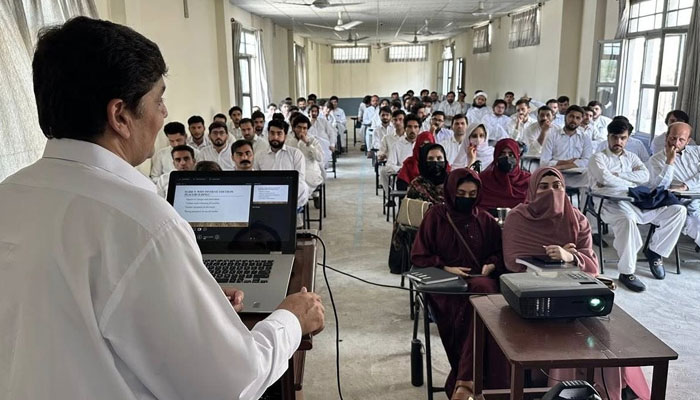Youth role in peace building underlined
MINGORA: The experts at a seminar on Thursday said that youth could play a vital role in fostering peace across the country.
“Over 64 percent of Pakistan’s population is under the age of 30. Young people represent a vital demographic force that can challenge violence, promote dialogue and rebuild fractured communities,” Dr Mahboob Ali, an academic and peace advocate, told the seminar.
The seminar on “The Role of Pakistani Youth in Peacebuilding” was held at the Muslim Law College, Swat. The session, led by Dr Mahboob Ali, gathered an enthusiastic audience of law students and faculty members who explored the crucial role of youth in shaping a peaceful and inclusive Pakistan.
Dr Ali outlined the country’s persistent peace challenges, including sectarian conflicts, religious extremism, political instability, and regional tensions. Despite these, he stressed the opportunity youth have to act as positive agents of change, particularly due to their openness, social media influence, and grassroots activism.
The seminar covered key areas where youth can contribute to peacebuilding, such as education, interfaith dialogue, community service, digital advocacy, political participation, and cultural expression. Initiatives like campus peace clubs, anti-hate digital campaigns, and youth parliaments were cited as examples of meaningful engagement.
Participants also learned from real-life success stories, including those of Nobel Laureate Malala Yousafzai, activist Jibran Nasir and the Swat Youth Front. These case studies illustrated how young individuals and collectives are actively working to restore harmony in conflict-affected areas.
However, Dr Ali acknowledged significant challenges faced by youth peacebuilders, including limited platforms, lack of institutional support, exposure to misinformation, and the risk of radicalization. He called for a National Youth Peace Policy, stronger government-NGO collaboration, and the integration of peace education at all levels to support youth-led peace initiatives.Concluding the session, Dr Ali urged students to play an active role in building peace: “Youth must reject violence, promote tolerance, and become ambassadors of dialogue and unity.”
-
 King Charles Speaks Out Over Andrew's Scandal: 'Stand Ready To Help Police'
King Charles Speaks Out Over Andrew's Scandal: 'Stand Ready To Help Police' -
 Dax Shepard Recalls Horrifying Accident That Almost Killed Him
Dax Shepard Recalls Horrifying Accident That Almost Killed Him -
 Logan Paul's Bodyguard Hits Fan On Super Bowl Day
Logan Paul's Bodyguard Hits Fan On Super Bowl Day -
 Epstein Files: Anne Hathaway Mentioned As Highly Desired Guest For Bill Gates?
Epstein Files: Anne Hathaway Mentioned As Highly Desired Guest For Bill Gates? -
 Prince Harry Under A Lot Of Stress As Meghan Markle Makes Bizarre Demands
Prince Harry Under A Lot Of Stress As Meghan Markle Makes Bizarre Demands -
 Princess Beatrice, Eugenie's Subtle Break From Disgraced Parents Exposed
Princess Beatrice, Eugenie's Subtle Break From Disgraced Parents Exposed -
 Baby Left In Running Bathtub Dies After Father ‘forgets’ Him
Baby Left In Running Bathtub Dies After Father ‘forgets’ Him -
 King Charles Takes A Major Step To Keep Horrified Prince William Out Of The Loop On Andrew: Insider
King Charles Takes A Major Step To Keep Horrified Prince William Out Of The Loop On Andrew: Insider -
 Taylor Swift Set To Make Biggest Cut From Her Wedding Guest: Blake Lively Or Ryan Reynolds
Taylor Swift Set To Make Biggest Cut From Her Wedding Guest: Blake Lively Or Ryan Reynolds -
 Prince William Meets Saudi Crown Prince Mohammed Bin Salman
Prince William Meets Saudi Crown Prince Mohammed Bin Salman -
 Brooklyn Beckham Brutally Cuts Off Inner Circle Amid Feud With David, Victoria
Brooklyn Beckham Brutally Cuts Off Inner Circle Amid Feud With David, Victoria -
 Kaley Cuoco Reveals Why Fiance Tom Pelphrey Sleeps In Seperate Room
Kaley Cuoco Reveals Why Fiance Tom Pelphrey Sleeps In Seperate Room -
 Ghislaine Maxwell Will Not Answer Congress Questions On Epstein
Ghislaine Maxwell Will Not Answer Congress Questions On Epstein -
 Kensington Palace Announces Prince William's Arrival In Saudi Arabia
Kensington Palace Announces Prince William's Arrival In Saudi Arabia -
 ‘Andrew Crisis Follows King Charles Everywhere Now’
‘Andrew Crisis Follows King Charles Everywhere Now’ -
 Jennifer Aniston Already Decided Her Wedding Dress?
Jennifer Aniston Already Decided Her Wedding Dress?




